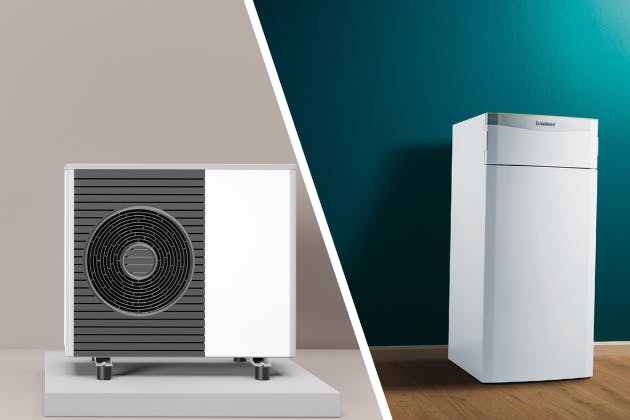Heat pumps offer a smart alternative to traditional systems. They work by transferring heat from the outside air or ground into your home, rather than generating heat directly. This clever approach not only slashes energy consumption but also significantly reduces carbon emissions.
In this blog, we compare both air source heat pumps and ground source heat pumps, looking at how they work, how well they perform, what's needed to install them, and which one is right for you.
If you prefer speaking with our heating engineers in Norwich and Norfolk, get in touch by calling us on 07824 393403 or 07939 979217.
Heat Pumps: Ground Source or Air Source Heat Pumps?
Air Source Heat Pumps
How They Work
Air source heat pumps extract heat from the outside air, even at temperatures as low as -15°C. The system comprises an outdoor unit that houses a fan to draw in air, and an indoor unit that distributes the heat.
The process involves:
- Air being drawn over a heat exchanger containing refrigerant
- The refrigerant absorbs heat from the air and evaporates
- A compressor increases the refrigerant's temperature
- The heated refrigerant transfers its heat to water for distribution through the home's heating system
Installation and Maintenance
Air source heat pumps are relatively straightforward to install. They don't require underground pipework, making them suitable for most properties. The outdoor unit is typically placed against an external wall, while the indoor unit is installed in a utility room or airing cupboard.
Ground Source Heat Pumps
How They Work
Ground source heat pumps extract heat from the ground using a network of underground pipes filled with a thermal transfer fluid (usually a water and antifreeze mixture). The system consists of:
- Ground loops
- Heat pump unit
- Distribution system
The ground maintains a relatively constant temperature year-round, typically between 10-12°C at depths of 1-2 metres.
Installation and Maintenance
Installing a ground source heat pump is more complex and costly than an air source system. It requires:
- Extensive groundworks for laying pipes
- Sufficient land area for horizontal systems or deep boreholes for vertical systems
- Disruption to landscaping during installation
Maintenance needs are generally lower than air source systems due to the underground components being protected from the elements. However, regular checks of the heat pump unit and antifreeze levels in the ground loop are necessary.

Key Differences Between Air Source and Ground Source Heat Pumps
Heat Source
The fundamental difference between air source and ground source heat pumps lies in their heat source. Air source systems extract heat from the air, which can fluctuate significantly in temperature, while ground source systems draw heat from the ground, benefiting from more stable temperatures.
Installation Costs
This difference in heat source also impacts installation costs. Air source heat pumps are generally more affordable, typically costing £7,000 to £13,000 to install. Ground source systems, however, range from £20,000 to £40,000 due to the extensive groundworks required.
Efficiency and Performance
When it comes to efficiency and performance, both systems are highly efficient, but ground source heat pumps generally have an edge. Air source efficiency tends to drop in very cold weather when heating demand is highest, whereas ground source systems maintain consistent efficiency year-round. However, recent improvements in air source heat pump technology have narrowed this performance gap, particularly in cold weather conditions.
Space Requirements
Space requirements also differ significantly between the two systems. Air source heat pumps require minimal outdoor space for the external unit, making them suitable for a wider range of properties. Ground source heat pumps, on the other hand, need significant land area for horizontal loops (about 3 times the heated floor area) or deep boreholes for vertical systems, which can limit their suitability for some properties.
Environmental Impact and Energy Efficiency
Despite these differences, both heat pump types offer significant environmental benefits compared to fossil fuel heating systems. They can reduce carbon emissions by up to 60-70% compared to gas boilers, depending on electricity grid carbon intensity. Both extract naturally occurring heat, reducing reliance on fossil fuels.
Ground source heat pumps typically have a slight edge in energy efficiency and emissions reduction due to their more consistent performance. However, as the UK electricity grid continues to decarbonise, the environmental benefits of both systems will increase further, making either choice a significant step towards more sustainable home heating.

